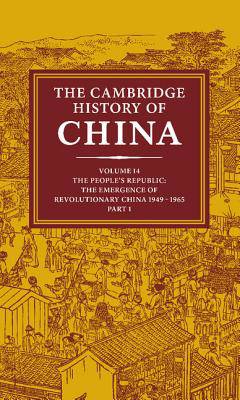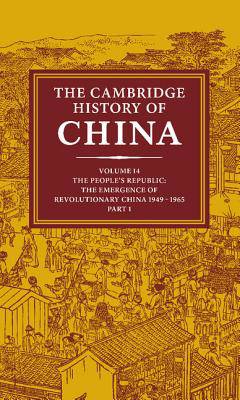
- Afhalen na 1 uur in een winkel met voorraad
- Gratis thuislevering in België vanaf € 30
- Ruim aanbod met 7 miljoen producten
- Afhalen na 1 uur in een winkel met voorraad
- Gratis thuislevering in België vanaf € 30
- Ruim aanbod met 7 miljoen producten
Zoeken
The Cambridge History of China
Volume 14, the People's Republic, Part 1, the Emergence of Revolutionary China, 1949 1965
€ 256,45
+ 512 punten
Omschrijving
This is the first of the two final volumes of The Cambridge History of China, which describe the efforts of the People's Republic of China to grapple with the problems of adaptation to modern times. Volume 14 deals with the achievements of the economic and human disasters of the new regime's first sixteen years (1949-65). Part I chronicles the attempt to adapt the Soviet model of development to China, and Part II covers the subsequent efforts of China's leaders to find native solutions that would provide more rapid and appropriate answers to China's problems. Each of the two parts of the volume analyzes the key issues and developments in the spheres of politics, economics, culture, education, and foreign relations. The contributors, all leading scholars of the period, show the interrelation of Chinese actions in all these spheres, and the describe how, gradually, events led to the Cultural Revolution launched by Mao Tse-tung in 1966.
Specificaties
Betrokkenen
- Uitgeverij:
Inhoud
- Aantal bladzijden:
- 742
- Taal:
- Engels
- Reeks:
- Reeksnummer:
- nr. 14
Eigenschappen
- Productcode (EAN):
- 9780521243360
- Verschijningsdatum:
- 26/06/1987
- Uitvoering:
- Hardcover
- Formaat:
- Genaaid
- Afmetingen:
- 163 mm x 231 mm
- Gewicht:
- 1133 g

Alleen bij Standaard Boekhandel
+ 512 punten op je klantenkaart van Standaard Boekhandel
Beoordelingen
We publiceren alleen reviews die voldoen aan de voorwaarden voor reviews. Bekijk onze voorwaarden voor reviews.










